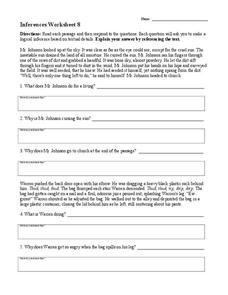Have Fun Teaching
Making Inferences Special Night (12)
Young writers will enjoy clowning around with this instructional activity that asks them to use clues in Katie's story to infer what is happening. Careful readers won't be tricked. The activity is a real treat.
Have Fun Teaching
Making Inferences (11)
Picture this. Kids read a story starter about Josh and his dad, use details in the tale to infer what will happen next, and then draw a picture of this outcome.
Have Fun Teaching
You Make the Call (10)
What will happen next? Young writers plot what will happen next after studying the clues in four story starters.
Reading Worksheets
Inferences Worksheet 8
Lead your class toward mastery of making inferences with a straightforward worksheet. Pupils read four short passages and make inferences based on the questions asked about each passage. They explain their reasoning for each inference by...
Reading Worksheets
Inferences Worksheet 7
Hone your learners' inference-making skills with this exercise. The learning exercise includes four passages that learners read and answer questions about. Pupils must note down their inferences along with textual evidence that support...
Have Fun Teaching
Who Am I? (14)
What's the difference between a clown and a cashier? Use context clues to infer what each character does for a living in five different reading passages. Kids mark their choices on the space provided.
Reading Worksheets
Inferences Worksheet 6
Have your learners mastered making inferences? Have pupils work their inferring muscles by completing this worksheet, which includes four passages to read and analyze. Learners answer two to three questions about each passage, providing...
Have Fun Teaching
When Am I? (16)
How can you tell when a story takes place? Use context clues to infer the time of day and seasons of five short reading passages. Kids then note each passage's time period as daytime or nighttime, as well as winter or summer.
Have Fun Teaching
Where Am I? (15)
Guess the setting in a series of reading passages that allow learners to make inferences. Five short descriptions prompt kids to match one of four settings, based on context clues.
Have Fun Teaching
Making Inferences Something Special (13)
Work on making inferences with a reading passage and comprehension questions. After kids read a short paragraph about Jalisa's birthday, they infer why she would be excited about receiving gifts from her brother.
Reading Worksheets
Inferences Worksheet 1
Knowing how to make inferences is a very important skill for readers of all ages. Help your pupils master this ability by providing practice. Pupils read four short passages and answer two to three questions about each to practice making...
Reading Worksheets
Inferences Worksheet 2
You might infer that is worksheet is all about making inferences. And you'd be correct! Invite your learners to read four short passages. After reading each passage, pupils make inferences and support their inferences with textual evidence.
K12 Reader
Using Inference in Writing
What could have happened to a plane buried in snow? Have kids practice making inferences with a writing prompt for which they describe a photo without using specific key words.
K12 Reader
Inference Practice 2: Where Am I?
Practice using context clues with a activity about making inferences. Five prompts encourage kids to interpret where each event takes place based on the details in each passage.
K12 Reader
Inference in Literature: The Wizard of Oz
We're off to see the wizard! Practice making inferences in literature with two sample paragraphs from L. Frank Baum's The Wonderful Wizard of Oz. Each passage provides questions about the pleasantness of the place it describes, and kids...
K12 Reader
Inference Practice: Who Am I?
Have a little fun teaching your class about inferences with this short and simple guess who exercise. Provided with five short passages describing different types of people, young learners must read each one and use the included details...
K12 Reader
Visual Clues
Whether you realize it or not, reading an image and reading a text require similar skills, including the ability to make inferences. For this simple worksheet, children look at a picture of a snowy winter day and answer a series of...
K12 Reader
What Do You See? (Inferences)
Making inferences is a skill that goes beyond the comprehension of written text. In this simple exercise, young learners are provided with a photograph and asked to answer a series of inference questions using only on the information...
Curated OER
Using Random Sampling to Draw Inferences
Emerging statisticians develop the ability to make inferences from sample data while also working on proportional relationships in general. Here, young learners examine samples for bias, and then use random samples to make inferences...
Curated OER
Observation and Inference
Assess your young scientists' understanding of the difference between observation and inference with this 20-question multiple choice quiz. It reviews a variety of physics and astronomy concepts, such as solar eclipses and sunspots, the...
Teacher Web
Inferring Character Traits
Learning how to draw inferences from text is a key reading comprehension skill. Here's a worksheet that gives readers a chance to practice by offering 20 descriptive sentences and asking kids to identify the inferred character trait, and...
Curated OER
Transparent Shoebox Dig
Take this simulated archaeological dig one layer at a time with your young pupils to encourage observation, critical thinking, and careful attention. Using a transparent box full of layers of sand and artifacts, pupils examine the...
Prestwick House
The House on Mango Street Activity Pack
Enrich a unit on The House on Mango Street by Sandra Cisneros with a selection of related activities. The packet contains nine activities that go from pre-reading through wrapping up the novel. Young readers work on studying author's...
Pearson
Making Inferences
The ability to make inferences is an important skill. Provide your class with some practice. This resource includes several different passages with which learners are required to practice inferring. They read each passage and respond to...

























